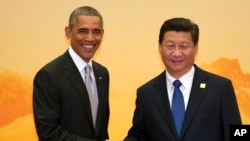Asia-Pacific leaders meeting at an economic summit in Beijing have given their initial approval to a China-led free trade zone.
The endorsement is seen as an achievement for Beijing, which has been pushing the Free Trade Area of the Asia-Pacific, or FTAAP, over a U.S.-led alternative.
Speaking Tuesday at the end of the Asia-Pacific Economic Summit, Chinese President Xi Jinping called the support "historic."
"We decided to launch the FTAAP process. It represents a historic step we've made toward the realization of the FTAAP and marks the official launch of the process. It represents the confidence and resolution of the APEC members to push forward regional economic integration," said Xi.
It is unclear how APEC's endorsement will help lead to the implementation the nascent trade initiative. The most tangible outcome appears to be the commissioning of a two-year study on how to achieve it.
U.S. officials have welcomed the Chinese plan, saying it does not conflict with Washington's preferred trade zone, the Trans-Pacific Partnership, which notably does not include China.
Free trade was a major focus of the APEC meeting and figures to be a big part of U.S. President Barack Obama's meetings with top Chinese leaders on Tuesday and Wednesday.
Presidents Obama and Xi are meeting Tuesday for dinner. On Wednesday, they will hold formal talks as part of a state visit by Obama.
Understanding on high-tech products
Earlier Tuesday, the U.S. and China reached a breakthrough that could lead to fewer tariffs on high-tech products.
President Obama and Chinese leaders have reached an understanding that could lead to the slashing of tariffs on high-tech exports like medical equipment and videogame consoles.
U.S. Trade Representative Michael Froman made the announcement in Beijing, where President Obama has been attending the Asia Pacific Economic Cooperation summit.
“This is encouraging news for the U.S.-China relationship. It shows how the U.S. and China work together to both advance our bilateral economic agenda but also to support the multilateral trading system,” said Froman.
The development comes as President Obama works to find common ground with China in the face of friction over issues including China’s maritime claims and the suspicion among Chinese leaders that the United States is trying to contain China's rise as a global power.
White House officials call the understanding an important breakthrough that they hope will bring about a rapid conclusion to negotiations for the Information Technology Agreement the World Trade Organization in Geneva.
Talks on the agreement have been on hold since last year due to disagreements on which products should be covered under the deal.
The announcement came a day after Obama unveiled a new arrangement to extend the validity of visas for Chinese visitors, a move he hopes will deepen ties and help the U.S. economy.
Both announcements have to do with economic cooperation and they happened in the first part of President Obama’s visit, in the framework of APEC.
That, analysts say, has been the easy part of the visit.
Obama’s meetings with Chinese leader Xi Jinping have thus far been in the context of the APEC summit, in the presence of leaders from across the Asia Pacific region.
State visit
The U.S president gets Xi’s undivided attention starting with a private dinner late Tuesday and Wednesday, when Obama’s state visit begins.
That is when more substantive security issues, including U.S. concerns over China’s maritime claims in the East and South China Seas, military-to-military relations, and also human rights, will be discussed.
During the APEC meetings Tuesday, President Obama had a number of brief opportunities to speak with Russian President Vladimir Putin. White House officials say the two talked about Iran, Syria, and Ukraine, but gave no details.
Later Wednesday, President Obama heads to Myanmar, also known as Burma, where, aside from attending two regional summits, he will encourage Myanmar’s leaders to speed up political reforms after the country’s emergence from decades of military rule.




